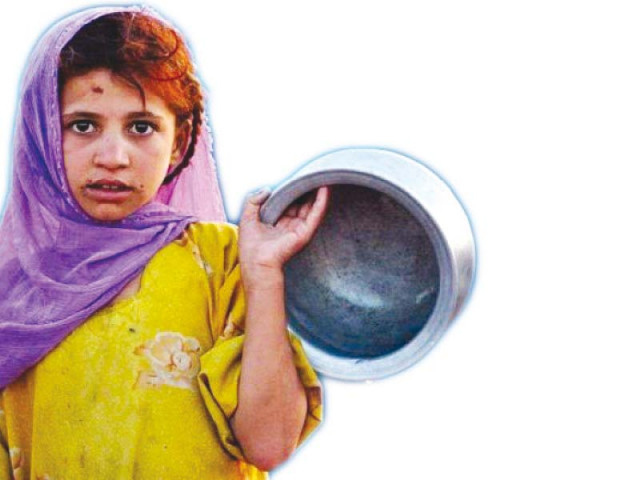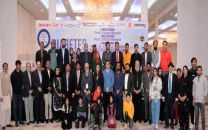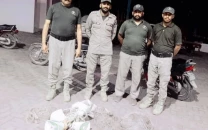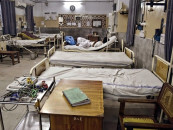Lives of minor domestic helpers: the ugliest face of child labour
As many as 82 cases of brutal torture of child domestic helpers have been reported in Lahore since January 2014

Akhtar, a minor boy who worked at the house of an MPA with his sister Atiya, could not bear the torture of his employers and died a day after Sawaira’s death. The boy bore over 16 torture marks on his body. Such is the cruelty children go through as domestic helpers.
Sindh passes law to prohibit child labour
As many as 82 cases of brutal torture on child domestic helpers have been reported in Lahore since January 2014, according to data collected by Child Protection and Welfare Bureau (CPWB). Over nine cases have been registered during ongoing year. As many as 45 cases were registered in 2016 and 28 in 2015.
Spokesperson for CPWB Waseem Ahmad told The Express Tribune that the actual number of torture cases was much higher. “These are the cases in which the victims were horribly tortured, an FIR was registered and the custody of the victim was taken by CPWB. There are some cases in which the victims even died due to severe torture,” he said.

A few days ago, a minor boy had died due to the torture by the daughter of an MPA in Akbari Gate area. Suspect Fauzia tortured Akhtar Ali and his sister Atiya repeatedly on minor issues. The postmortem report of Akhtar also confirmed that he died due to repeated incidents of torture. Akhtar and Atiya’s tale is the story of countless other minor domestic helpers.
Child labour: Eight children handed over to protection bureau
Zafar Iqbal, uncle of Akhtar Ali said the parents of the victims were poor and lived in Okara. Few years ago, they had moved to Akbari Gate area of Lahore and rented a house. The father of the boy worked as a labourer. On failure to make ends meet, Akhtar’s mother started working at the house of the MPA as domestic helper. After sometime, she engaged her children there too. Parents of the victims Akhtar and Atiya had developed separated due to differences. The father returned to his native village while the children remained at the house of the MPA.
During their stay at MPA Shah Jahan’s house for over two years, no one from their family came to meet them. Zafar claimed that victims’ parents abandoned them at MPA’s house because Fauzia had promised to provide education to Atiya and Akhtar. He said the parents later made several attempts to meet their children but the MPA’s family did not allow them saying the children were not at home, had gone out to park, school or some other place.
In another case, a minor girl Sawaira was allegedly tortured by her employers so brutally in October 2016 that she got paralysed. The suspects had thrown her from the roof of their house after severe torture. The minor girl died on July 10 after struggling for life for over eight months.
Iftikhar Mubarak, an activist affiliated with Child Rights Movement, said domestic help have developed into a ‘well-established industry’.
“No such cases of torture against children at workplaces have ever been reported in any other professions such as carpenter or mechanic shops, while children working as domestic helpers are always exposed to torture,” he said.

“Legislation is a quick solution to it but legislators do not pay attention to it because they themselves are involved in the crime,” he claimed.
Homenet Pakistan Executive Director Umme Laila said rapid urbanisation, deterioration of agriculture sector and rise in poverty has turned domestic help into an industry. With the rise of the industry, ‘mafias’ have emerged too who bring children from villages and a domestic helper is available as low as Rs5,000. Poverty is the main reason behind all this.
Keeping kids safe: Punjab govt vows to end child labour
“Due to mass urbanisation and other phenomena many people became rich overnight but they do not groom morally, socially and culturally. So they stick to their old ways of treating servants with feudal mindset. Legislation, implementation, punishment and massive sensitisation campaigns were a solution to the problem,” she asserted.
National Coordinator Red Workers Front Adam Paul said engaging children in domestic help was the modern form of slavery as they had to stay at their workplace 24/7. “They have no rights and always remain underpaid. Their employers torture them over minor mistakes. These children live in unhygienic conditions and are fed on crumbs and leftover of what their employers eat. They are also sexually abused,” he said.
According to some estimates there were around 9.5 million children in Pakistan who were employed as domestic helpers, Adam claimed. He said children worked as domestic helper due to extreme poverty.
“If the economic conditions and living standards of people get better, no one would let his children work as domestic helper.”
Adam said it was a conflict of the rich versus the poor, a fact hardly discussed at any forum.
“Mere a legislation is not a solution to it. There are lots of legislations for example that of minimum wages but it was never implemented. The state has not the capacity to implement it. Even provision of Rs15,000 for eight hours works to a man will never improve his living standards. The issue will be resolved when workers will organise themself for their rights and launch a movement for their rights,” he remarked.
Published in The Express Tribune, July 20th, 2017.



















COMMENTS
Comments are moderated and generally will be posted if they are on-topic and not abusive.
For more information, please see our Comments FAQ